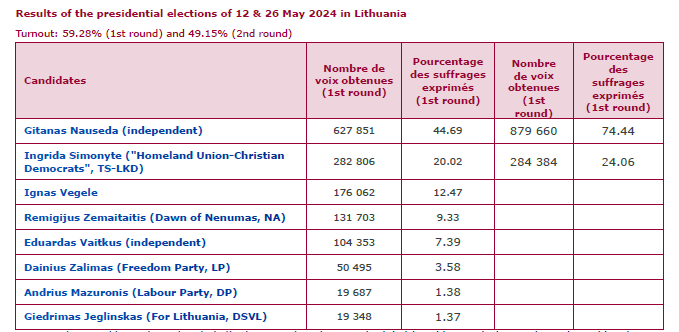Results
Elections in Europe
Corinne Deloy
-

Available versions :
EN

Corinne Deloy
Outgoing President of the Republic Gitanas Nauseda won the 2nd round of the presidential election in Lithuania on 26 May by a wide margin. Three quarters of voters supported his name, with 74.44% of the vote. He had been the big favourite in the polls and, with 44.69% of the vote, only narrowly missing re-election in the 1st round of voting on 12 May. Once again, Gitanas Nauseda emerged victorious in his battle against Prime Minister Ingrida Simonyte (Homeland Union-Christian Democrats, TS-LKD), who won 24.06% of the vote.
This is the largest victory for a candidate in a presidential election since Lithuania regained its independence in 1990.
Fewer than half of Lithuanians went to the polls for a presidential election that appeared to be a foregone conclusion. Turnout was 49.15%, 10.13 points lower than in the 1st round.

"The Lithuanian people have granted me an important mandate and I am well aware that I must cherish this vote of confidence," declared Gitanas Nauseda when the results were announced. "Now that I have five years' experience, I believe that I will certainly be able to use this precious gift properly, first and foremost to achieve the objectives of guaranteeing the well-being of all the people of Lithuania," he added. "Lithuania's independence and freedom are like a fragile vessel that we must cherish and prevent from cracking”.
Gitanas Nauseda represents continuity, stability and security, essential points in the eyes of Lithuanians against the backdrop of the war in Ukraine. Lithuania has a border of just over 200 kilometres with the Russian exclave of Kaliningrad. The country sees itself as the Russian army's next target should Moscow emerge victorious from the war in Ukraine. "The hatred fostered by Russia threatens our world order. It threatens each and every one of us" declared Gitanas Nauseda on the day marking the two-year anniversary of the invasion of Ukraine by the Russian armed forces on 24 February.
The head of state promised to continue to put pressure on Lithuania's Western allies to step up their military support for Kyiv. "My top priorities are to support Ukraine, strengthen Lithuania's security, implement an active foreign policy and participate effectively in the various initiatives of the European Union".
On 21 March, the Seimas (parliament) passed a motion setting the minimum defence budget at 3% of GDP from 2025 (it currently stands at 2.80%). Vilnius has also just announced that it will be installing permanent fortifications at certain strategic points on its border in the coming months. These will be in addition to the eighteen so-called "counter-mobility parks" throughout the country, where equipment (anti-tank obstacles, reinforced concrete blocks, reels of barbed wire) designed to slow the progress of an enemy force inside the country will be stored. According to an opinion poll carried out by the ELTA/Baltijos Tyrimai institute in February-March this year, just over half of Lithuanians believe that a Russian attack against their country is possible, or even very likely.
As the two presidential candidates share the same views on Russia and most foreign and defence policy issues, their personalities and positions on socio-economic issues were decisive in the Lithuanian vote.
Gitanas Nauseda, 60, from Klaipeda, the country's third largest city on the Baltic Sea, has a degree in economics from Vilnius University. He worked in various economic bodies (Economic and Privatisation Research Institute, Lithuanian Competition Council) before joining the Central Bank of Lithuania in 1994 (in the Commercial Bank Regulation Department and then the Monetary Policy Department). Between 2000 and 2008, he served as chief economist and adviser to the president of AB Vilniaus Bankas before joining SEB Bankas as financial analyst and then chief economist, a position he held until 2018.
On 26 May 2019, Gitanas Nauseda won the presidential election with 66.53% of the vote, beating Ingrida Simonyte (33.47%), who was running as an independent candidate at the time. Five years later, to the day, he was acclaimed by his compatriots and triumphantly re-elected as head of state.
On the same theme
To go further
Elections in Europe
Corinne Deloy
—
15 April 2025
Elections in Europe
Corinne Deloy
—
25 February 2025
Elections in Europe
Corinne Deloy
—
18 February 2025
Elections in Europe
Corinne Deloy
—
28 January 2025

The Letter
Schuman
European news of the week
Unique in its genre, with its 200,000 subscribers and its editions in 6 languages (French, English, German, Spanish, Polish and Ukrainian), it has brought to you, for 15 years, a summary of European news, more needed now than ever
Versions :



